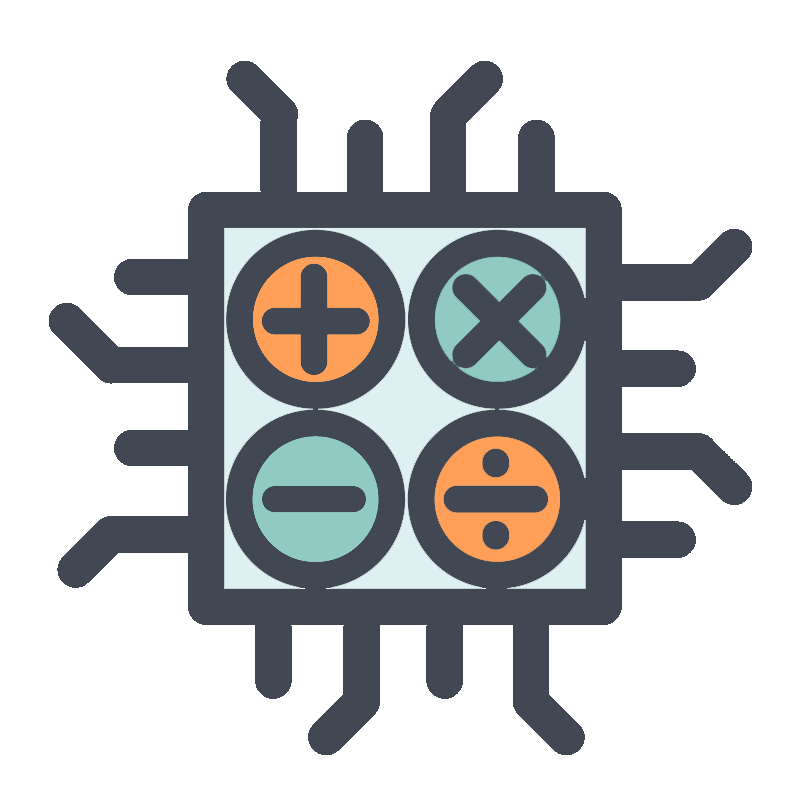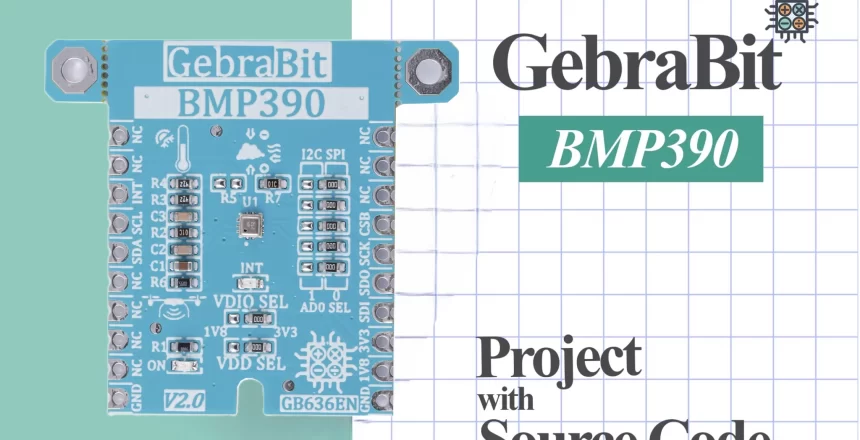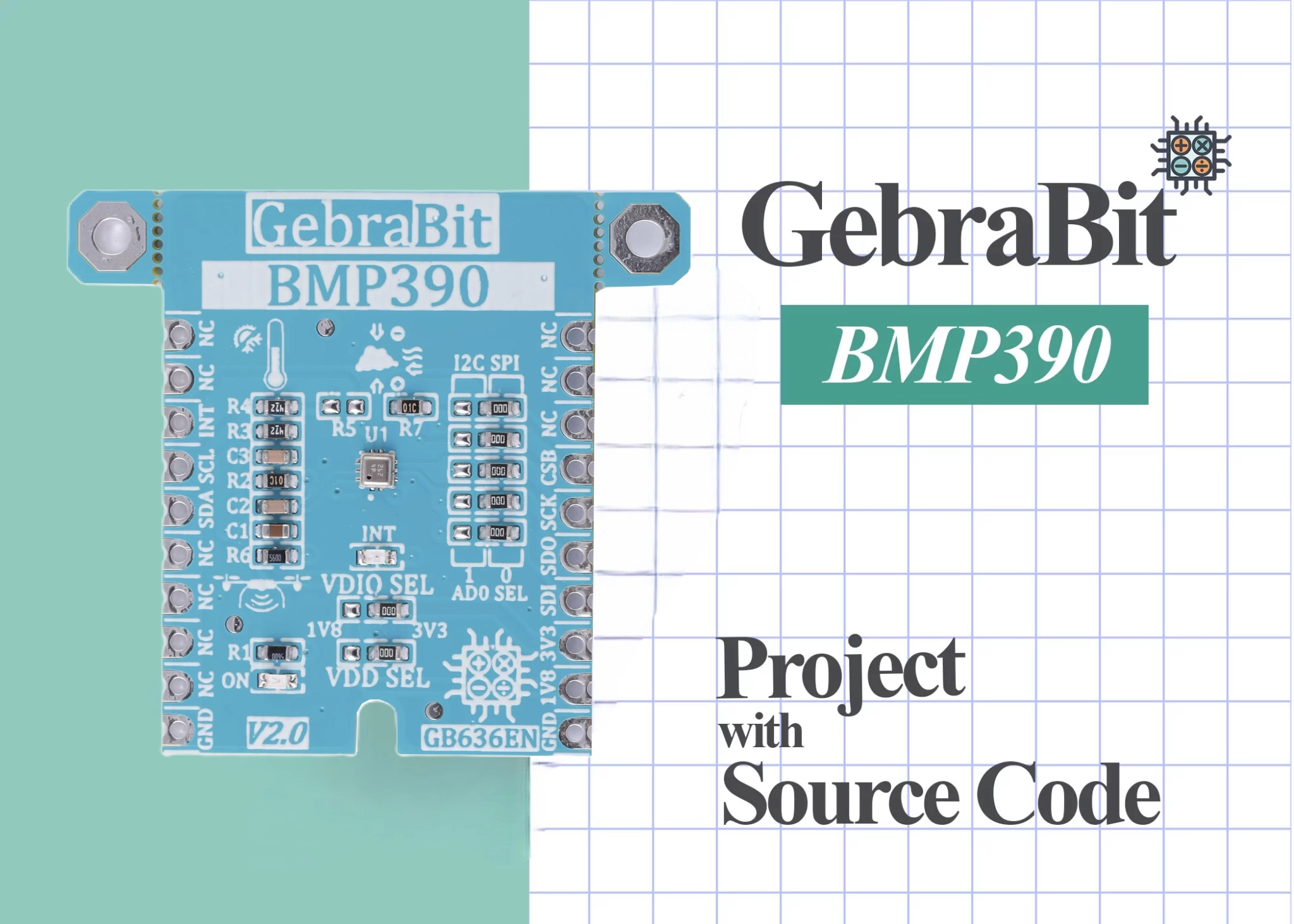What's the purpose of this project?
The purpose of this project is to interface the BMP390 barometric pressure sensor with an Arduino to measure and monitor atmospheric pressure and altitude in various environments. The sensor provides accurate pressure readings, making it suitable for applications like weather forecasting, altitude tracking, and environmental monitoring. By reading atmospheric data in real-time, users can develop systems that respond to changing altitude and pressure conditions for enhanced usability and precision in environmental data collection.
What are we going to learn in this tutorial?
In this tutorial, you’ll learn how to:
- Connect the BMP390 sensor to an Arduino and establish SPI communication.
- Modify an existing library to be compatible with Arduino, deepening understanding of SPI data handling.
- Read barometric pressure and altitude data using the sensor, interpreting the data for practical applications.
- Implement sensor-based projects for environmental monitoring and altitude tracking, gaining practical skills for creating responsive systems based on atmospheric pressure measurements.
This hands-on guide provides insights into sensor integration and real-time data monitoring with Arduino.
What do we need to start this project?
As you probably know, we need some hardware and software to do this project. The titles of these hardware and software are provided to you in the table below and you can prepare/download by clicking on each of them and get ready to start.
|
Required hardware
|
Required software
|
|---|---|
|
Arduino UNO
|
|
First as shown in the image below, we connect the GebraBit BMP390 module to the Arduino UNO as follows:

Then download and add the GebraBit BMP390 library to your Arduino IDE.
|
Required Library
|
|---|
If you don’t know how to add GebraBit libraries to Arduino IDE, refer to the tutorial link below.
BMP390 library and driver
In addition to the modular design of various sensors and ICs, GebraBit tries to provide variety of structured and hardware-independent libraries in C++ language for the ease of users in setting up and developing software.
For this purpose, after preparing each GebraBit module, the users can refer to the “tutorial” section of the desired module and download the dedicated library, which contains the “ .h” and “ .cpp” file (Header and Source) and a sample training program under “GebraBit STM32F303”, “GebraBit ATMEGA32A” or “Arduino” development boards.
All the defined functions and structures in the library are commented in full detail and all the received parameters in the arguments of the functions and their return values, are briefly explained. Since the libraries are hardware independed, the user can easily add the library in any of their favorite compilers and develop it by desired microcontroller and development board.
GebraBit_BMP390.h header file
In this file, based on the datasheet of the sensor or IC, all address registers, the values of each register are defined in the form of “Enumeration”. Also, the casing of the BMP390 sensor and the configurations related to each of the BMP390 sensor internal blocks are defined in the form of a “STRUCT” with the name GebraBit_BMP390.
USER REGISTER MAP
The registry map or sensor commands are defined in this section:
/************************************************
* USER BANK 0 REGISTER MAP *
***********************************************/
#define BMP390_CHIP_ID_VALUE (0x60)
#define BMP390_CHIP_ID (0x00)
#define BMP390_REV_ID (0x01)
#define BMP390_ERR_REG (0x02)
#define BMP390_STATUS (0x03)
#define BMP390_PRESSURE_DATA_0 (0x04)
#define BMP390_PRESSURE_DATA_1 (0x05)
#define BMP390_PRESSURE_DATA_2 (0x06)
#define BMP390_TEMPERATURE_DATA_3 (0x07)
#define BMP390_TEMPERATURE_DATA_4 (0x08)
#define BMP390_TEMPERATURE_DATA_5 (0x09)
#define BMP390_SENSORTIME_0 (0x0C)
#define BMP390_SENSORTIME_1 (0x0D)
#define BMP390_SENSORTIME_2 (0x0E)
#define BMP390_EVENT (0x10)
#define BMP390_INT_STATUS (0x11)
#define BMP390_FIFO_LENGTH_0 (0x12)
#define BMP390_FIFO_LENGTH_1 (0x13)
#define BMP390_FIFO_DATA (0x14)
#define BMP390_FIFO_WTM_0 (0x15)
#define BMP390_FIFO_WTM_1 (0x16)
#define BMP390_FIFO_CONFIG_1 (0x17)
#define BMP390_FIFO_CONFIG_2 (0x18)
#define BMP390_INT_CTRL (0x19)
#define BMP390_IF_CONF (0x1A)
#define BMP390_PWR_CTRL (0x1B)
#define BMP390_OSR (0X1C)
#define BMP390_ODR (0x1D)
#define BMP390_CONFIG (0x1F)
#define BMP390_CALIB_DATA (0x31)
#define BMP390_CMD (0x7E)
/*----------------------------------------------*
* USER REGISTER MAP End *
*----------------------------------------------*/
Error_Condition Enum
Sensor errors are defined in this enum:
1. typedef enum Error_Condition
2. {
3. FATAL_ERR = 1 ,
4. CMD_ERR = 2 ,
5. CONF_ERR = 4
6. }BMP390_Error_Condition;
Sensor_Status Enum
The sensor performance status is defined in this enum:
1. typedef enum Sensor_Status
2. {
3. CMD_RDY = 0x10 ,
4. DRDY_PRESS = 0x20 ,
5. DRDY_TEMP = 0x40
6. }BMP390_Sensor_Status;
Interrupt_Status Enum
The occurred interrupt type is defined in this enum:
1. typedef enum Interrupt_Status
2. {
3. FIFO_WATERMARK_INTERRUPT = 0x01 ,
4. FIFO_FULL_INTERRUPT = 0x02 ,
5. DATA_READY_INTERRUPT = 0x08
6. }BMP390_Interrupt_Status
Data_Select Enum
Using this Enum, it is determined whether the output data is filtered or not:
1. typedef enum Data_Select
2. {
3. UNFILTERED_DATA = 0 ,
4. FILTERED_DATA
5. }BMP390_Data_Select;
FIFO_Mode Enum
The values of this enum are used to define the measurement rate of sensor data values:
1. typedef enum FIFO_Mode
2. {
3. STREAM_TO_FIFO = 0 ,
4. STOP_ON_FULL_FIFO_SNAPSHOT = 1
5. }BMP390_FIFO_Mode
BMP390_Ability Enum
The ability to activate or deactivate different parts of the sensor is defined in this enum:
1. typedef enum Ability
2. {
3. Disable = 0 ,
4. Enable
5. }BMP390_Ability;
BMP390_Power_Mode Enum
The values of this enum are used to select the sensor Power mode:
1. typedef enum Power_Mode
2. {
3. SLEEP_MODE = 0,
4. FORCED_MODE = 1,
5. NORMAL_MODE = 3
6. } BMP390_Power_Mode;
BMP390_Sensor_Oversampling Enum
The values of this enum are used to select oversampling of the sensor:
1. typedef enum Pressure_Oversampling
2. {
3. X1_NO_OVERSAMPLING = 0 ,
4. X2_OVERSAMPLING = 1 ,
5. X4_OVERSAMPLING = 2 ,
6. X8_OVERSAMPLING = 3 ,
7. X16_OVERSAMPLING = 4 ,
8. X32_OVERSAMPLING = 5
9. } BMP390_Sensor_Oversampling;
BMP390_Output_Data_Rate Enum
The values of this enum are used to select the sensor output data rate:
1. typedef enum Output_Data_Rate
2. {
3. ODR_200_HZ_5_mS = 0 ,
4. ODR_100_HZ_10_mS = 1 ,
5. ODR_50_HZ_20_mS = 2 ,
6. ODR_25_HZ_40_mS = 3 ,
7. ODR_12P5_HZ_80_mS = 4 ,
8. ODR_6P25_HZ_160_mS = 5 ,
9. ODR_3P1_HZ_320_mS = 6 ,
10. ODR_1P5_HZ_640_mS = 7 ,
11. ODR_0P78_HZ_1280_mS = 8 ,
12. ODR_0P39_HZ_2560_mS = 9 ,
13. ODR_0P2_HZ_5120_mS = 10 ,
14. ODR_0P1_HZ_10240_mS = 11 ,
15. ODR_0P05_HZ_20480_mS = 12 ,
16. ODR_0P02_HZ_40960_mS = 13 ,
17. ODR_0P01_HZ_81920_mS = 14 ,
18. ODR_0P006_HZ_163840_mS = 15 ,
19. ODR_0P003_HZ_327680_mS = 16 ,
20. ODR_0P0015_HZ_655360_mS = 17
21. } BMP390_Output_Data_Rate;
BMP390_IIR_Filter_Coefficient Enum
The values of this enum are used to select the appropriate sensor calibration coefficients values:
1. typedef enum IIR_Filter_Coefficient
2. {
3. FILTER_BYPASS_MODE = 0 ,
4. FILTER_COEFFICIENT_1 = 1 ,
5. FILTER_COEFFICIENT_3 = 2 ,
6. FILTER_COEFFICIENT_7 = 3 ,
7. FILTER_COEFFICIENT_15 = 4 ,
8. FILTER_COEFFICIENT_31 = 5 ,
9. FILTER_COEFFICIENT_63 = 6 ,
10. FILTER_COEFFICIENT_127 = 7
11. } BMP390_IIR_Filter_Coefficient;
BMP390_ FIFO_Header Enum
The values of this enum are used to select the data frame type in the FIFO header:
1. typedef enum FIFO_Header
2. {
3. FIFO_EMPTY_FRAME = 0x80 ,
4. FIFO_CONFIG_CHANGE = 0x48 ,
5. FIFO_ERROR_FRAME = 0x44 ,
6. FIFO_TIME_FRAME = 0xA0 ,
7. FIFO_PRESS_FRAME = 0x84 ,
8. FIFO_TEMP_FRAME = 0x90 ,
9. FIFO_TEMP_PRESS_FRAME = 0x94
10. } BMP390_FIFO_Header;
BMP390_Preparation Enum
The values of this enum determine whether the data is ready or not:
1. typedef enum Preparation
2. {
3. IS_Ready = 0 ,
4. IS_NOT_Ready
5. }BMP390_Preparation;
BMP390_ Get_DATA Enum
The values of this enum are used to determine how to receive sensor data:
1. typedef enum Get_DATA
2. {
3. FROM_REGISTER = 0 ,
4. FROM_FIFO
5. } BMP390_Get_DATA;
BMP390_Reset_Status Enum
The values of this enum determine whether the sensor is reset or not:
1. typedef enum
2. {
3. DONE = 0 ,
4. FAILED = 1
5. }BMP390_Reset_Status;
BMP390_ INT_Level Enum
The values of this enum are used to determine the basic logic level of Interrupt:
typedef enum int_level
{
ACTIVE_LOW = 0 ,
ACTIVE_ HIGH
} BMP390_INT_Level;
BMP390_ Latch_Type Enum
The values of this enum are used to determine the Interrupt output latch type:
typedef enum latch_type
{
NOT_LATCH = 0 ,
LATCH
} BMP390_Latch_Type;
BMP390_ INT_Type Enum
The values of this enum are used to determine the Interrupt output type:
typedef enum int_type
{
PUSH_PULL = 0 ,
OPEN_DRAIN
}BMP390_INT_Type;
BMP390 struct
All sensor properties, calibration coefficients and sensor data are defined in this “struct” and All the information and configuration implemented on the sensor are stored in this “structure” and you can see the changes in each part of the sensor any time you want.
typedef struct BMP390
{
uint8_t REGISTER_CACHE;
BMP390_Get_DATA GET_DATA;
BMP390_Reset_Status RESET;
uint8_t DEVICE_ID;
uint8_t REVISION_ID;
BMP390_Sensor_Status SENSOR_STATUS;
BMP390_Error_Condition ERROR_CONDITION;
BMP390_Power_Mode POWER_MODE;
BMP390_Ability PRESSURE;
BMP390_Sensor_Oversampling PRESSURE_OVERSAMPLING;
BMP390_Ability TEMPERATURE;
BMP390_Sensor_Oversampling TEMPRATURE_OVERSAMPLING;
BMP390_Output_Data_Rate OUTPUT_DATA_RATE;
BMP390_Data_Select OUTPUT_DATA;
BMP390_IIR_Filter_Coefficient IIR_FILTER;
BMP390_Interrupt_Status INTERRUPT_STATUS;
BMP390_Ability DATA_READY_INT;
BMP390_INT_Level INT_PIN_LEVEL;
BMP390_INT_Type INT_PIN_TYPE;
BMP390_Latch_Type INT_PIN_LATCH;
BMP390_Ability FIFO;
BMP390_FIFO_Mode FIFO_MODE;
BMP390_Ability TEMP_TO_FIFO;
BMP390_Ability PRESS_TO_FIFO;
BMP390_Ability TIME_TO_FIFO;
uint16_t FIFO_DATA_BUFFER_SIZE;
uint8_t BYTE_QTY_IN_ONE_FIFO_PACKET;
uint8_t TOTAL_FIFO_PACKET;
BMP390_Ability FIFO_WATERMARK;
uint8_t FIFO_SUBSAMPLING;
uint16_t FIFO_LENGTH ;
BMP390_Ability FIFO_FULL_INT;
uint8_t CALIBRATION_DATA[CALIBRATION_DATA_BUFFER_SIZE];
double PAR_T1;
double PAR_T2;
double PAR_T3;
double PAR_P1;
double PAR_P2;
double PAR_P3;
double PAR_P4;
double PAR_P5;
double PAR_P6;
double PAR_P7;
double PAR_P8;
double PAR_P9;
double PAR_P10;
double PAR_P11;
uint8_t REGISTER_RAW_DATA_BUFFER[REGISTER_RAW_DATA_BYTE_QTY];
int32_t REGISTER_RAW_PRESSURE;
int32_t REGISTER_RAW_TEMPERATURE;
double COMPENSATED_TEMPERATURE;
double COMPENSATED_PRESSURE;
//double ALTITUDE;
uint8_t FIFO_DATA[FIFO_BUFFER_SIZE];
BMP390_FIFO_Header FIFO_HEADER[TOTAL_PACKET];
double COMPENSATED_FIFO_TEMPERATURE[TOTAL_PACKET];
double COMPENSATED_FIFO_PRESSURE[TOTAL_PACKET];
double FIFO_ALTITUDE[TOTAL_PACKET];
}GebraBit_BMP390;
Declaration of functions
At the end of this file, all the functions for reading and writing in BMP390 registers, sensor configuration and receiving data from the sensor are declared:
1. /********************************************************
2. *Declare Read&Write BMP390 Register Values Functions *
3. ********************************************************/
4. extern uint8_t GB_BMP390_Read_Reg_Data ( uint8_t regAddr,uint8_t* data);
5. extern uint8_t GB_BMP390_Read_Reg_Bits (uint8_t regAddr,uint8_t start_bit, uint8_t len, uint8_t* data);
6. extern uint8_t GB_BMP390_Burst_Read(uint8_t regAddr,uint8_t *data, uint16_t byteQuantity);
7. extern uint8_t GB_BMP390_Write_Reg_Data(uint8_t regAddr, uint8_t data);
8. extern uint8_t GB_BMP390_Write_Reg_Bits(uint8_t regAddr, uint8_t start_bit, uint8_t len, uint8_t data);
9. extern uint8_t GB_BMP390_Burst_Write ( uint8_t regAddr,uint8_t *data, uint16_t byteQuantity);
10. /********************************************************
11. * Declare BMP390 Configuration Functions *
12. ********************************************************/
13. extern void GB_BMP390_Soft_Reset ( GebraBit_BMP390 * BMP390 );
14. extern void GB_BMP390_Get_Device_ID(GebraBit_BMP390 * BMP390);
15. extern void GB_BMP390_Get_Revision_ID(GebraBit_BMP390 * BMP390);
16. extern void GB_BMP390_Temperature(GebraBit_BMP390* BMP390 ,BMP390_Ability temp);
17. extern void GB_BMP390_Pressure(GebraBit_BMP390 * BMP390 , BMP390_Ability press);
18. extern void GB_BMP390_Output_Sample_Rate (GebraBit_BMP390 * BMP390 , BMP390_Output_Data_Rate rate);
19. extern void GB_BMP390_IIR_Filter_Coefficient (GebraBit_BMP390 * BMP390 , BMP390_IIR_Filter_Coefficient filter) ;
20. extern void GB_BMP390_Check_Sensor_Status(GebraBit_BMP390 * BMP390 );
21. extern void GB_BMP390_Check_Error_Codition(GebraBit_BMP390 * BMP390 );
22. extern void GB_BMP390_Check_FIFO_Full_Interrupt_(GebraBit_BMP390 * BMP390 );
23. extern void GB_BMP390_Check_Data_Ready_Interrupt(GebraBit_BMP390 * BMP390 );
24. extern void GB_BMP390_Temperature_OverSampling(GebraBit_BMP390* BMP390 ,BMP390_Sensor_Oversampling temp_over) ;
25. extern void GB_BMP390_Pressure_OverSampling(GebraBit_BMP390* BMP390 ,BMP390_Sensor_Oversampling press_over);
26. extern void GB_BMP390_Power_Mode(GebraBit_BMP390* BMP390 ,BMP390_Power_Mode pmode);
27. extern void GB_BMP390_Set_INT_Pin(GebraBit_BMP390 * BMP390 , BMP390_INT_Level level ,BMP390_INT_Type type , BMP390_Latch_Type latch ) ;
28. extern void GB_BMP390_Data_Output_Select(GebraBit_BMP390 * BMP390 , BMP390_Data_Select data_sel) ;
29. extern void GB_BMP390_Data_Ready_Interrupt(GebraBit_BMP390 * BMP390 , BMP390_Ability data_ready_int);
30. extern void GB_BMP390_FIFO(GebraBit_BMP390 * BMP390 , BMP390_Ability fifo) ;
31. extern void GB_BMP390_FIFO_Full_Interrupt(GebraBit_BMP390 * BMP390 , BMP390_Ability fifo_full_int) ;
32. extern void GB_BMP390_Write_SensorTime_FIFO(GebraBit_BMP390 * BMP390 , BMP390_Ability time_fifo );
33. extern void GB_BMP390_Write_Pressure_FIFO(GebraBit_BMP390 * BMP390 , BMP390_Ability press_fifo );
34. extern void GB_BMP390_Write_Temperature_FIFO(GebraBit_BMP390 * BMP390 , BMP390_Ability temp_fifo );
35. extern void GB_BMP390_FIFO_Mode(GebraBit_BMP390 * BMP390 , BMP390_FIFO_Mode fifo_mode );
36. extern void GB_BMP390_FIFO_DownSampling(GebraBit_BMP390 * BMP390,uint8_t dwnsmple);
37. extern void GB_BMP390_FIFO_WATERMARK (GebraBit_BMP390 * BMP390,BMP390_Ability watermark , uint16_t wm);
38. extern void GB_BMP390_GET_FIFO_Length (GebraBit_BMP390 * BMP390 ) ;
39. extern void GB_BMP390_FIFO_Flush(GebraBit_BMP390 * BMP390 );
40. extern void GB_BMP390_Read_FIFO(GebraBit_BMP390 * BMP390 , uint16_t qty);
41. extern void GB_BMP390_FIFO_Configuration ( GebraBit_BMP390 * BMP390 , BMP390_FIFO_Ability fifo );
42. /********************************************************
43. * Declare BMP390 DATA Functions *
44. ********************************************************/
45. extern void GB_BMP390_Get_Register_Raw_Pressure_Temperature(GebraBit_BMP390 * BMP390 ) ;
46. extern void GB_BMP390_Calculate_Compensated_Temperature(GebraBit_BMP390 * BMP390 , int32_t raw_temp , double * valid_temp ) ;
47. extern void GB_BMP390_Calculate_Compensated_Pressure(GebraBit_BMP390 * BMP390 , int32_t raw_press , double valid_temp ,double * valid_press );
48. extern void GB_BMP390_FIFO_Data_Partition_Pressure_Temperature(GebraBit_BMP390 * BMP390);
49. extern void GB_BMP390_Altitude(GebraBit_BMP390 * BMP390);
50. extern void GB_BMP390_Get_Data(GebraBit_BMP390 * BMP390 , BMP390_Get_DATA get_data);
51. /********************************************************
52. * Declare BMP390 HIGH LEVEL Functions *
53. ********************************************************/
54. extern void GB_BMP390_Set_Power_Management(GebraBit_BMP390 * BMP390 , BMP390_Power_Mode pmode) ;
55. extern void GB_BMP390_initialize( GebraBit_BMP390 * BMP390 );
56. extern void GB_BMP390_Configuration(GebraBit_BMP390 * BMP390, BMP390_FIFO_Ability fifo);
GebraBit_ BMP390.cpp source file
In this file, which is written in C++ language, all the functions are commented in full detail, and all the parameters received in the arguments of the functions and their return values are clearly explained so we confine to these explanations and invite users to check this file directly for more information.

Sample program in Arduino
After connecting the module to Arduino and adding the library to the IDE, go to the following path: File > Examples > GebraBit_BMP390 > Temp-Press
Description of Sample file
At the beginning of the file, you will find the GebraBit_BMP390.h header included to provide access to the necessary structures, enums, and functions for the GebraBit BMP390 module. Additionally, the required elements for the module’s operation have been added to these structures. A variable named BMP390 of the GebraBit_BMP390 structure type (defined in the GebraBit_BMP390 header and detailed in the library’s description section) is then declared to configure the GebraBit BMP390 module.
GebraBit_BMP390 BMP390;
In the next section of the written code, we set and configure the GebraBit BMP390 module using the GB_BMP390_initialize (&BMP390) and GB_BMP390_Configuration (&BMP390, FIFO_DISABLE) functions:
void setup() {
Serial.begin(9600);
SPI.begin();
GB_BMP390_initialize( &BMP390 );
GB_BMP390_Configuration(&BMP390, FIFO_DISABLE) ;
}
void loop() {
GB_BMP390_Get_Data(&BMP390, FROM_REGISTER);
Serial.print("Compensated Temperature: ");
Serial.print(BMP390.COMPENSATED_TEMPERATURE);
Serial.println(" °C");
Serial.print("Compensated Pressure: ");
Serial.print(BMP390.COMPENSATED_PRESSURE);
Serial.println(" mBar");
delay(1000);
}
The Sample file code text:
#include "GebraBit_BMP390.h"
GebraBit_BMP390 BMP390;
void setup() {
Serial.begin(9600);
SPI.begin();
GB_BMP390_initialize( &BMP390 );
GB_BMP390_Configuration(&BMP390, FIFO_DISABLE) ;
}
void loop() {
GB_BMP390_Get_Data(&BMP390, FROM_REGISTER);
Serial.print("Compensated Temperature: ");
Serial.print(BMP390.COMPENSATED_TEMPERATURE);
Serial.println(" °C");
Serial.print("Compensated Pressure: ");
Serial.print(BMP390.COMPENSATED_PRESSURE);
Serial.println(" mBar");
delay(1000);
}
Connect your arduino to computer and select your Arduino Board

Then Verify and Upload the Sample code

After uploading the code, open the serial monitor and you can see the BMP390 datas via SerialMonitor.


In the following, you can download the GebraBit_BMP390 Library, the schematic of the modules and the “BMP390 datasheet”.
Program output video
The video of the module operation will be uploaded soon


